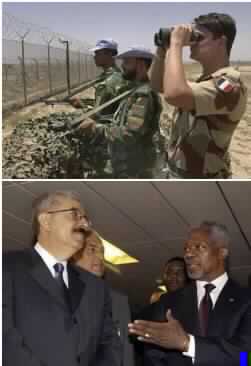HIGHLIGHTS: Usual Conflicting U.S.-Iraqi Accounts of Raid||Annan Says 'Satisfied' With Vienna Session, 3rd of its Kind Since March||Iraq & UN Close to Agreement on Returning Kuwait's National Archives Looted By Baghdad During 1991 Gulf War|| STORY: American warplanes bombed an Iraqi air defense system Thursday. According to the U.S. European Command in Germany, the aircraft were making routine patrols when Iraqi forces fired artillery at them near the northern city of Mosul.
"Coalition aircraft responded to the continued Iraqi attacks by dropping precision ordnance on elements of the Iraqi integrated air defense system," the Germany-based command said. "All coalition aircraft departed the area safely."
In Iraq, the official news agency said U.S. and British warplanes damaged a house and killed several cows and sheep in the air strikes, but the report did not cite any human casualties.
U.S. and British warplanes based in southern Turkey patrol a no-fly zone established in northern Iraq in 1991 to protect the Kurdish population from Iraqi forces.
Iraq does not recognize the zone and has been challenging allied aircraft since 1998. A similar zone was set up over southern Iraq to protect Shiite Muslims.
U.N., IRAQ MAKE WEAPONS PROGRESS
Emerging from four hours of closed talks in Vienna, U.N. officials and Saddam Hussein's representatives said Thursday that they had made some progress toward returning U.N. weapons inspectors to Iraq. (Read photo caption)
U.N. Secretary-General Kofi Annan declared he was "satisfied" with the session. But he sidestepped the question of whether a deal was near that would let inspectors back in Iraq for the first time in 3 years.
Iraqi Foreign Minister Naji Sabri, too, appeared cheerful about the session.
Iraq had a broad list of subjects it wanted considered before going into talks, while the United Nations appeared focused largely on the return of its inspectors.
The Iraqi regime wants the United Nations to lift sanctions and address U.S. threats to topple Saddam before agreeing to U.N. demands.
Under U.N. Security Council resolutions, sanctions can be lifted only when inspectors certify that Iraq's programs to develop nuclear, chemical and biological weapons have been destroyed, along with long-range missiles that can deliver such arms.
The Vienna-based U.N. nuclear agency reiterated it was ready to return to the inspection task at any time. Jacques Baute, the agency's team leader for Iraq, said inspectors could move into the country within a few days of a decision.
In another sign of progress, U.N. spokesman Fred Eckhard said Iraq and the United Nations were close to agreement on returning Kuwait's national archives, which were looted during the 1991 Gulf War.
Describing the deal as significant, Eckhard said "it takes us in the direction of eventual normalization." The diplomats are working on how to handle the actual handover of the six truckloads of papers.
The two-day meeting is the third since early March between Annan and Sabri. After the last session in May, Annan reported progress.
Obstacles remain, however. Part of the problem is that Annan alone doesn't have the power to resolve the key issues Iraq wants addressed before allowing the return of inspectors, who left in 1998 ahead of allied air strikes meant to punish Iraq for blocking inspections.
Sabri gave Annan a list of 19 political questions at their first meeting - and Iraq is still waiting for answers. The questions focus on lifting sanctions, U.S. threats against Iraq and the "no-fly" zones over northern and southern Iraq enforced by U.S. and British aircraft.
Annan sent Sabri's questions to the Security Council, which imposed sanctions on Iraq after its 1990 invasion of Kuwait. Chief weapons inspector Hans Blix answered the technical questions about inspections at the second round of talks, but the council decided not to respond to the political questions.
PHOTO CAPTION
(Top) A French UNIKOM (United Nations Iraq Kuwait Observer Mission) peacekeeper looks through his binoculars, as two Bangladesh UNIKOM peacekeepers stand beside him at the Iraqi-Kuwaiti Border at Um-Kaser, Iraq, in Basra province, Thursday, July 4, 2002. U.N. officials and Iraqi diplomats emerged side by side after closed-door talks on the return of U.N. weapons inspectors Thursday, declaring that they had made some progress after four hours of negotiations. (AP Photo/Hussein Malla).
(Bottom) United Nations Secretary General Kofi Annan, right, and Iraqi Foreign Minister Naji Sabr talk to each other and the media after meeting at the U.N. office in Vienna, Austria Wednesday, July 4, 2002. U.N. officials and Iraqi diplomats emerged side by side after closed-door talks on the return of U.N. weapons inspectors Thursday, declaring that they had made some progress after four hours of negotiations. (AP Photo/United Nation
- Author:
& News Agencies - Section:
WORLD HEADLINES


 Home
Home Discover Islam
Discover Islam Quran Recitations
Quran Recitations Lectures
Lectures
 Fatwa
Fatwa Articles
Articles Fiqh
Fiqh E-Books
E-Books Boys & Girls
Boys & Girls  Ramadan
Ramadan Fatwa Audios
Fatwa Audios Month of Mercy
Month of Mercy Women
Women Eed Al- Fitr
Eed Al- Fitr Food Recipes
Food Recipes Videos
Videos

 Prayer Times
Prayer Times












